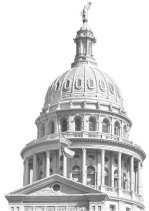State Capital
Tax-relief plan headed to governor
Proponents are calling it the “biggest property tax cut in Texas history.” Both chambers of the Texas Legislature passed an $18 billion package during the second special session, the Austin American- Statesman reported.
If signed as expected by Gov. Greg Abbott, the bill raises the homestead exemption to $100,000, with an additional $40,000 exemption for owners 65 and older. It also dedicates more than $12 billion to lower school property taxes.
Agreement on a tax cut plan took months of haggling between competing plans in the House and Senate. After House Speaker Dade Phelan and Lt. Gov. Dan Patrick met, a plan began to fall into place.
“I thank my partners in the Texas Legislature for coming together to honor the best interests of hardworking Texans who want to own their property—not rent it from the government,” Abbott said in a statement following the passage of the tax plan.
The Legislature adjourned after passage of the bill in the House. Another special session is likely in the fall to address Abbott’s bid to enact a school voucher plan.
Abbott aide named interim attorney general A longtime aide to Abbott was named as the second interim attorney general, replacing John Scott, who served in the role a little over a month. Angela Colmenero has been serving as Abbott’s deputy chief of staff. Previously she worked in the attorney general’s office for nearly a decade.
“John Scott faithfully executed his duties as the interim Attorney General of Texas, and I thank him for his leadership in stepping up to serve his fellow Texans in this role,” Abbott said.
Ken Paxton was suspended from that position after being impeached on 20 counts by the House and awaits a trial in the Senate on Sept. 5.
Scott told the Texas Tribune that he will “return to working as a consultant, attorney and board member for a broad variety of companies.” He previously served as Abbott’s secretary of state before returning to the private sector.
Second heat wave means record demand on grid
The second heat wave of the summer means the state’s power grid is breaking records for demand almost daily, the Houston Chronicle reported. The Electric Reliability Council of Texas is forecasting several thousand megawatts of excess supply, with demand late last week exceeding 84,000 megawatts. ERCOT manages the power grid serving about 90% of the state, except for part of East Texas and the El Paso area.
Excessive heat warnings have been issued for much of the state, with heat index values topping 117 degrees around the Houston area. Much of the state is also experiencing triple-digit temperatures with high humidity.
The latest heat wave is baking much of the Southwest, with alltime record highs expected in Phoenix, Las Vegas and Palm Springs, California.
Drought conditions expected to expand
A hotter and drier June for much of the state means 45% of the state may slip back into drought conditions, according to Mark Wentzel, hydrologist with the Texas Water Development Board. At the end of June, about a fourth of the state was in drought, a marked reduction from winter conditions, thanks to ample rainfall.
“The latest seasonal drought outlook from the National Weather Service anticipates that drought will expand to cover most of central, southern, and West Texas by the end of September,” Wentzel wrote.
However, the recent switch to El Niño weather conditions typically bring cooler and wetter-thannormal conditions this fall and winter.
First case of West Nile virus reported this year Public health officials have confirmed the state’s first case of West Nile virus, occurring in Dallas County, according to the Texas Department of State Health Services.
The virus is transmitted through mosquito bites. Most people do not get sick, but about 20% develop symptoms such as headaches, fever, muscle and joint aches, nausea and fatigue. Less than 1% of those infected develop more serious symptoms, including death.
“It’s important for people to be aware that there are many diseases transmitted by mosquitoes found in Texas,” said DSHS Commissioner Jennifer Shuford. “Most of these diseases cause mild illness but in rare instances diseases like dengue or Zika can cause severe illness. We’ve even had a locally acquired case of malaria in Texas this year, which underscores the importance of taking precautions to prevent mosquito bites.”
DSHS urges people when outdoors to wear long sleeves and pants, apply insect repellent, remove standing water in yards, such as in plant pots, and buckets. The state had 41 cases of West Nile disease last year with seven deaths.
State slips in business-friendly rankings
An annual ranking of the most business- friendly states in America has always included Texas among the top five, but not this year, the Texas Standard reported. The latest rankings in CNBC’s report had the state coming in sixth, behind North Carolina, Virginia, Tennessee, Georgia and Minnesota.
The study has been undertaken since 2007. Business reporter Erica Greider with the Houston Chronicle cites several factors, including the electric grid, which averages about 20 hours a year without power on average in the state — third worst in the country. Other possible factors are quality of life issues, such as the environment and crime. “It could be that maybe there’s an element of, you know, the state’s been coasting on its laurels because we’ve been so used to this growth and success that it’s become a little bit less of the top line issue,” Greider told the Standard. *****
Gary Borders is a veteran award-winning Texas journalist. He published a number of community newspapers in Texas during a 30-year span, including in Longview, Fort Stockton, Nacogdoches and Cedar Park.

